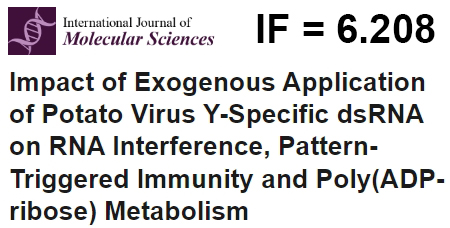Press-room / news / Science news /
Impact of Exogenous Application of Potato Virus Y-Specific dsRNA on RNA Interference, Pattern-Triggered Immunity and Poly(ADP-ribose) Metabolism in Potato Plants
Methods for inhibition of viral infection induced by spraying plants with preparations of specific double-stranded RNAs (dsRNAs) are currently being actively developed. Researchers from the Laboratory of functional genomics and plant proteomics, the Laboratory of Molecular Diagnostics and the Laboratory of Molecular Bases of Plant Stress Resistance of the Institute of Bioorganic Chemistry RAS studied the contribution of potato plant treatment with dsRNA against potato virus Y (dsRNA-PVY) to two dsRNA-induced plant defense mechanisms: specific RNA interference (RNAi) and non-specific pattern-triggered immunity (PTI).
It has been shown that application of PVY dsRNA in potato plants induced accumulation of both small interfering RNAs (siRNAs), a hallmark of RNAi, and some gene transcripts related to PTI. Moreover, RNAi acts as the major virus resistance mechanism in plant, since the non-specific defense was unable to inhibit the replication of potato virus X unrelated to PVY. In addition we also showed that PVY-specific dsRNA is able to upregulate production of a key enzyme involved in poly(ADP-ribose) metabolism, namely poly(ADP-ribose) glycohydrolase (PARG), which is regarded as a positive regulator of biotic stress responses. These findings offer insights for future development of innovative approaches which could integrate these defense mechanisms in a co-ordinated manner, to ensure a high level of plant protection.
The results are published in the International Journal of Molecular Sciences.
august 15, 2022


